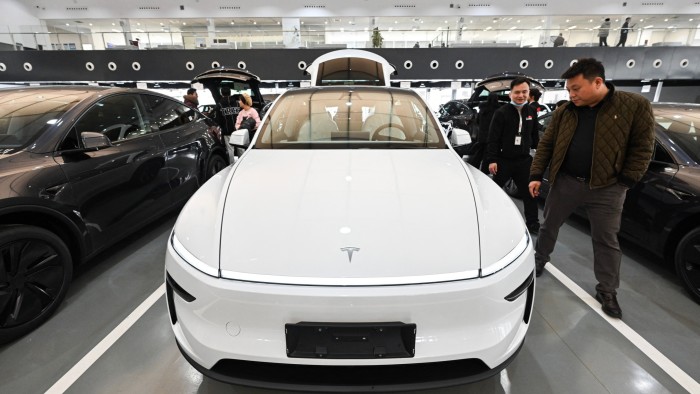Unlock the Editor’s Digest for free
Roula Khalaf, Editor of the FT, selects her favourite stories in this weekly newsletter.
Tesla’s deliveries tumbled in the first three months of this year, marking its worst quarter since 2022, as the electric-vehicle maker faced a consumer backlash in Europe, fierce competition in China and a delayed revamp of its flagship model.
The US group, led by Elon Musk, delivered 336,681 cars in the first quarter, far fewer than the 390,000 forecast by analysts and 387,000 in the same period last year.
The figure lagged behind that of China’s BYD, which has regained its crown as the world’s best-selling electric-vehicle maker after this week reporting sales of 416,388 EVs in the same period.
Tesla’s shares were down 6.3 per cent in early trading in New York on Wednesday.
Musk, a key ally of US President Donald Trump, has hurt Tesla’s brand in Europe through his interventions in the region’s politics. Delays to the upgrade of its flagship Model Y car also dented sales in the quarter.
The company is banking on a revival in demand after finally launching the redesigned Model Y in China in February and Europe last month.
In a statement, Tesla said the changeover of Model Y lines had led to the loss of several weeks of production during the quarter. “The ramp-up of the New Model Y continues to go well,” it added.
But the upgrade, which will be executed in phases, has not yet lifted sales, with new registrations falling sharply in France, Sweden and other European markets during the first quarter.
The troubled rollout of the new Model Y comes as Tesla’s challenges grow in China, the world’s largest EV market and one in which BYD has a commanding lead.
Tesla’s ageing product portfolio has hit its market share in the country just as BYD has improved its hybrid and electric offerings and pressed ahead with an overseas expansion. Tesla is also facing more competition from established carmakers such as BMW and Volkswagen.
The damage to the Tesla brand is a new challenge for the EV pioneer whose popularity among consumers had previously drawn praise from rivals such as Volkswagen.
Tesla shares soared following Trump’s election victory in November, giving the company a market capitalisation of $1.5tn at their peak in December, but have since fallen more than 40 per cent.
The steep drop prompted Musk to make a personal appeal to Tesla employees to hold on to their shares, saying the company’s plans for autonomous driving would boost its fortunes.

